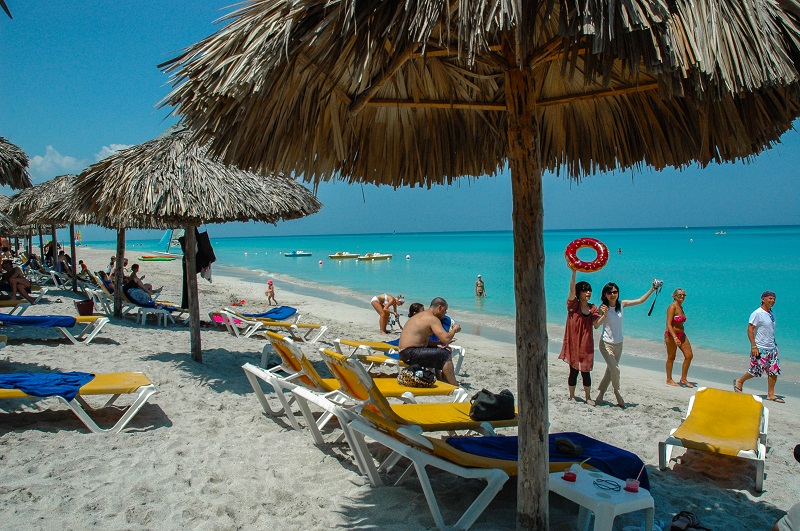
U.S. tourism could increase revenue for private businesses in Cuba (Photo by Aylín Pérez, used with permission)
Private entrepreneurs living on the island could earn more than $47 million each year if the ban on U.S. travel to Cuba were lifted, says an economic analysis by U.S. experts Paul Lebon and William Luker [1].
Some of the leading private activities developed in the country currently consist of renting rooms in private homes and so-called “paladares”, restaurants serving different types of food for prices ranging between $12 and $30. Foreigners tend to favor these cheaper options during their stay on the island.
According to Lebon and Luker, if there are 1,583 rental properties and the majority of them have two rooms for rent with an average rate of $35 per night, this would equal 3,166 rooms each night. “It is too optimistic to think that all of them would be occupied, but a flood of American tourists could easily reach 70 or even 80 percent”. The authors explain that:
For discussion purposes let us use the 61.4% occupancy rate (…). This would yield 1931 room nights of occupancy daily which would generate $67,594 per night in private income countrywide. This occupancy rate would yield 3,862 potential diners purchasing lunch at a cafeteria and dinner at a Paladar. This could potentially generate $46.350 in private income for dinners and $11,588 in private income for lunches, a gross total of $125,532 per day! Annualized, that is $47,933,873 in private income to Cuban citizens who would welcome Americans with open arms.
The Fund for Reconciliation and Development's [2] Cuba Program notes that each year an increasing number of Americans travel to Cuba after obtaining a license from the United States Department of Treasury. Add to this the tens of thousands of U.S. citizens who also travel through another country to get to Cuba, thus violating the U.S. ban. According to this program:
The US law which denies Americans the freedom to travel to Cuba is an anachronism of the Cold War and is completely counterproductive to proclaimed US policy goals. The continued existence of the travel ban is evidence that the political and financial power of special interests can supersede the national and humanitarian interest of both the American and Cuban people.
“The chorus of voices clamoring for changes in U.S. policy toward Cuba has been growing louder and more varied in recent months,” says Cuban Americans for Engagement (CAFE) [3]. CAFE is a community organization that brings together Cuban-Americans and U.S. citizens seeking to facilitate a new relationship between the two countries based on the principals of exchange, commitment, normalizing relationships, and diplomacy. Its members point out that:
Whether it’s Hillary Rodham Clinton saying she favors normal relations with Cuba or former Director of National Intelligence John Negroponte signing a letter calling for greater engagement with the island nation, the momentum for a new approach to Cuba is undeniable. It is within this context that our group, Cuban Americans for Engagement, is visiting Washington this week (…) We’ve come to Washington to convey an important message to policymakers: A new generation of Cuban Americans has come of age, and we’re ready to talk about engaging with Cuba.
The halo effect and U.S. taxpayer money

These “Almendrones” also constitute a fundamental travel vehicle for tourists. Photo by Aylín Pérez. Used with permission.
Lebon and Luker suggest that the normalization of U.S. citizens traveling to Cuba could produce a halo effect, or “how the sale can ‘grow’ in a transaction”:
So where does the halo effect come in with Casa Particulars and Paladares. Every one of these entrepreneurs hires people. Cleaning lady/crew, cooks, wait staff, bartenders, dishwashers who garner private wages. The owners can refer tourists to private individuals who could provide tour guide services to generate private income. There are many private automobile operators in Cuba who could transport tourists locally or intra-city, avoiding the state taxis. Private individuals sell souvenirs and religious artifacts. Private produce stands are opening across the country to supply Paladares. The income possibilities for private citizens in Cuba through the halo effect generated by CPs and Paladares are endless.
Most American travelers may be young people who cannot afford hotel rooms for $100 a night, Lebon and Luker add. The offering of private homes that also pose a more direct interaction with Cuban families is undoubtedly an attraction for this type of tourist.
Since the mid-1990s, the U.S. Department of State and the U.S. Agency for International Development (USAID) have spent about $240 million to promote a change in the political system in Cuba, says Tracey Eaton on his blog Along the Malecon [4]. “Support for democracy in Cuba costs more than $17.5 million annually,” he adds.
Lebon and Luker go on to say that:
Hence if you accept the notion that less than 10% of US Taxpayers funding makes its way to Cuba, in some 15+ years $24 Million has landed in Cuba to support a small cadre of self-proclaimed activists, many of whom are paid merely to maintain their loyalty to the South Florida political cabal and to voice opposition to easing sanctions against their fellow countrymen. With an opening of tourist travel to Cuba double that amount could make its way to Cuba in only one year, directly helping people who could use and would appreciate the help. This revenue would be a direct infusion of hard dollars, not redistributed funds or taxpayer dollars. It is staggering to think how only 1583 Casa Particulars could make such a tremendous impact.